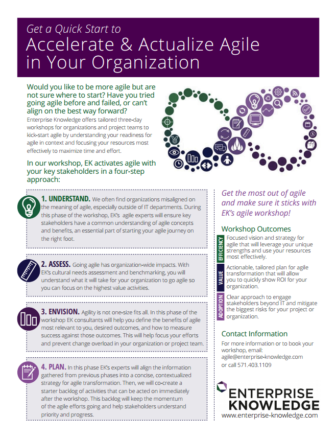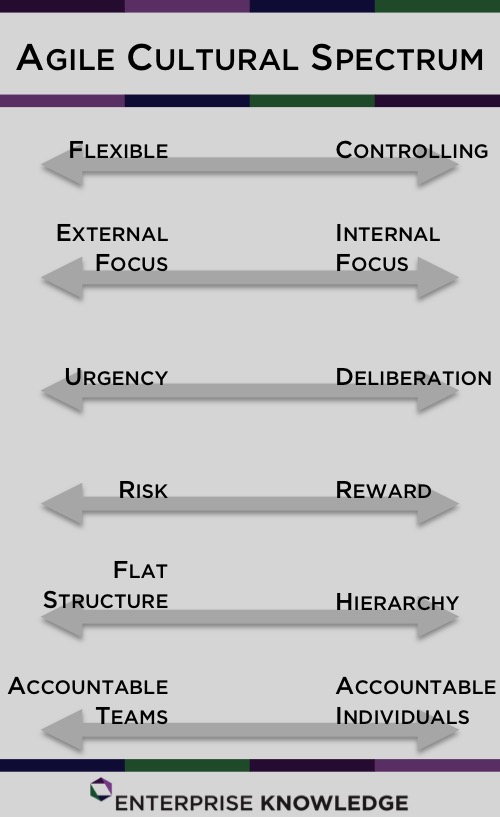EK’s Quick Start Kit for Agile

While many IT businesses want to go agile, many of them do not know where to start. Others come to us after a failed agile transformation in which a development team was sent to a Certified ScrumMaster training and told they were agile without being armed with the practical tools to succeed. Indeed, many of our clients do not realize they may need to change their organization design, SDLC processes, or technology infrastructure to maximize success in their agile transformation.
In order to help our clients get started with agile quickly and understand underlying changes that may need to happen for them to support an agile environment, we created an Agile Design Workshop. The overarching goal of this workshop is to create a strategy and plan to maximize our clients’ investments in agile.
The advantages of a workshop methodology for agile implementations are threefold. First, the workshop is a low-risk, low-cost way for business leaders to understand what it takes to be agile and create an actionable set of next steps to continue on their agile journey in a smart, sustainable way. Each organization or team will need to take slightly different steps to build fertile ground for adopting agile.
Second, there are typically varying levels of understanding of agile throughout the technology industry, government and private sector, and the workshop includes one day of built-in agile training. Agile is a term that gets thrown around a lot, but often suffers from a lack of shared understanding. The benefit of this training is that it allows participants to end the workshop speaking the same language and expecting the same outcomes as they plan to go agile.
Third, the workshop can be scaled to include the actual future practitioners of agile. This means it serves as a powerful change management tool to get buy-in and solicit input from those who might otherwise resist the change. With a lack of change management as one of the major reasons agile transformations fail, this piece is critical to starting the effort on the right note.
In order to elicit useful information, we lead workshop participants through a number of activities that will serve as crucial inputs into the organization’s customized agile transformation roadmap. Here is a sampling of three activities our clients have found valuable during past workshops:
 Cultural factors play a major part in the success (or failure) of an agile transformation. In this exercise, we ask participants to identify a current state of tailored cultural factors that impact their organization the most. For example, past factors we have measured include risk vs. reward, individual accountability vs. team accountability, or urgency vs. deliberation in decision-making. In this example, perceptions may differ based on factors like seniority or geographic region, so it’s important to include a diverse array of participants.
Cultural factors play a major part in the success (or failure) of an agile transformation. In this exercise, we ask participants to identify a current state of tailored cultural factors that impact their organization the most. For example, past factors we have measured include risk vs. reward, individual accountability vs. team accountability, or urgency vs. deliberation in decision-making. In this example, perceptions may differ based on factors like seniority or geographic region, so it’s important to include a diverse array of participants.- Identifying a common vision is an important step toward working together toward an agile transformation. In this activity, we lead participants through a visioning activity to define the desired future state. Many organizations that are large or long tenured have a good deal of organizational debt – which can range from outdated policies to a high degree of complexity in technology systems. Naturally, expecting this organization to function like a technology startup may not be realistic. However, adopting agile is still possible, especially in a grass-roots or incremental fashion. This activity helps participants define a clear, achievable target state that is unique to their organization.
- Developing and prioritizing the agile transformation backlog is a crucial step to investing resources wisely. The agile transformation backlog is a prioritized list of all the work that needs to be done for an organization to reach its transformation goals. Many teams and organizations may feel overwhelmed with the amount of change required for teams to adopt agile; clear priorities and limits for simultaneous work in progress will help show progress early and prevent burnout.
Interested in booking an Agile Design Workshop for your team or organization? Contact us at info@enterprise-knowledge.com.
